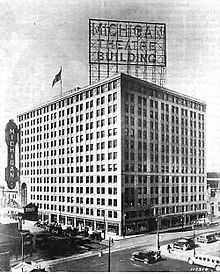Michigan Building
| Michigan Theatre Building | |

The Michigan's Building lobby, filled with sculptures, busts, intricately carved furnishings, paintings and onyx pedestals, made it seem as much a museum as a movie theater. Photo taken in 1926.
|
|
| Address | 220 Bagley Avenue Detroit, Michigan United States |
|---|---|
| Coordinates | 42°20′04″N 83°03′12″W / 42.334536°N 83.053298°W |
| Owner | John H. Kunsky |
| Capacity | 4,050 |
| Current use | Office Space, Coworking Space, Retail Space, Restaurant, Bar, Parking garage, Parking lot |
| Construction | |
| Opened | 1926 |
| Closed | 1976 |
| Architect | Rapp & Rapp |
| Website | |
| MichiganTheaterDetroit.com | |
The Michigan Building is an office building and the former Michigan Theater in downtown Detroit, Michigan. It was constructed in 1925 and stands at 13 floors in height. Today it contains a bar, restaurant, retail space, office space, a parking garage, and the shared coworking space Cowork at The Michigan.
The high-rise was constructed in the Renaissance Revival. The exterior of the building is faced with brick with terra cotta and granite accents. The ground level contains retail space with large windows still framed by the original decorative metal work.
It opened August 23, 1926 and was designed by the architectural firm of Rapp & Rapp for Detroit philanthropist and movie theater owner John H. Kunsky. The theater's construction cost $5 million (equivalent to $62 million in 2008). With a seating capacity of 4050, the concert hall/movie house was one of the largest in Michigan. Throughout the 1950s and 1960s, the theater changed ownership several times. It was subsequently used for various events: in the 1960s a closed-circuit television provided views of Red Wings ice hockey games for those who could not attend the actual event in nearby Olympia Stadium, and in the 1970s the theater was a nightclub and concert venue for rock bands.
Upon its completion the Michigan Theater could seat 4,050 patrons, although theatre developer John Kunsky boasted 4,500 seats. In addition to films in its prime years, the theatre hosted performances of bands led by John Philip Sousa, Benny Goodman, Jimmy Dorsey and Harry James as well as live performances by The Marx Brothers, Betty Grable and Bob Hope.
...
Wikipedia
